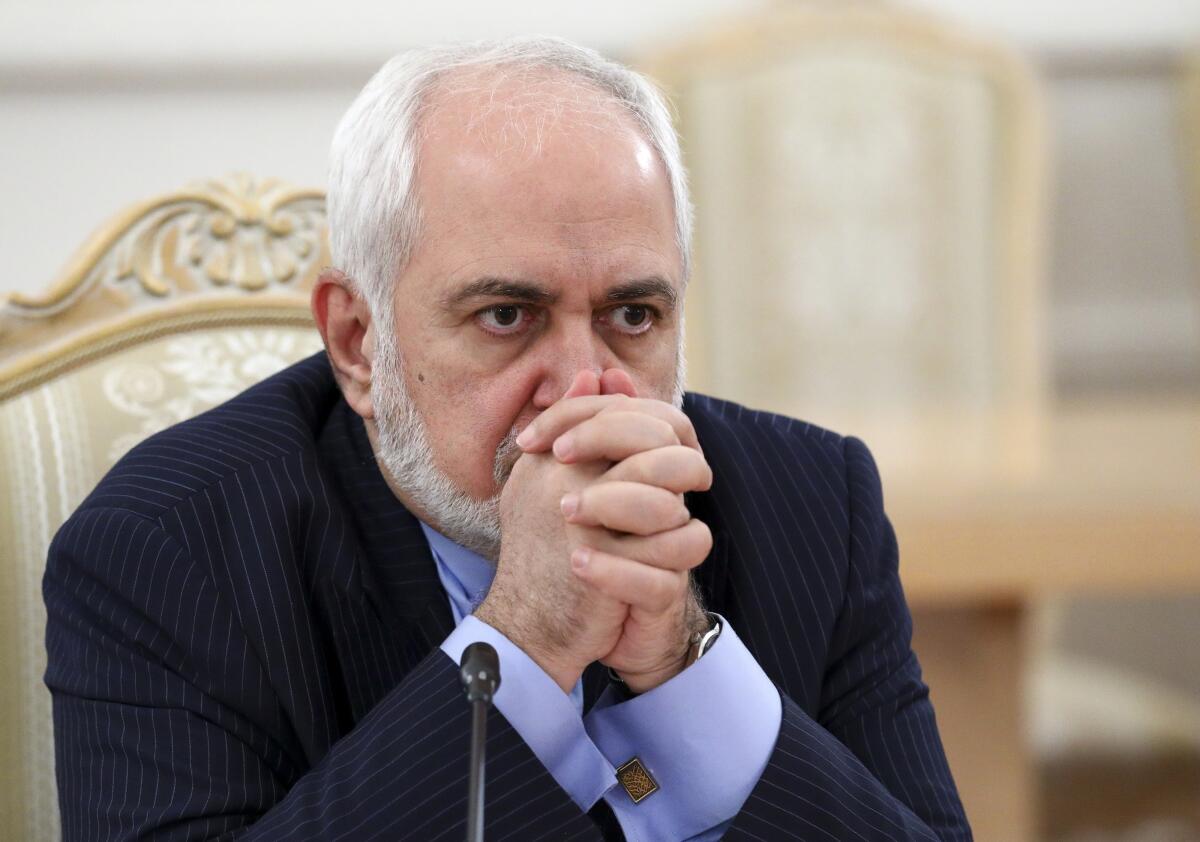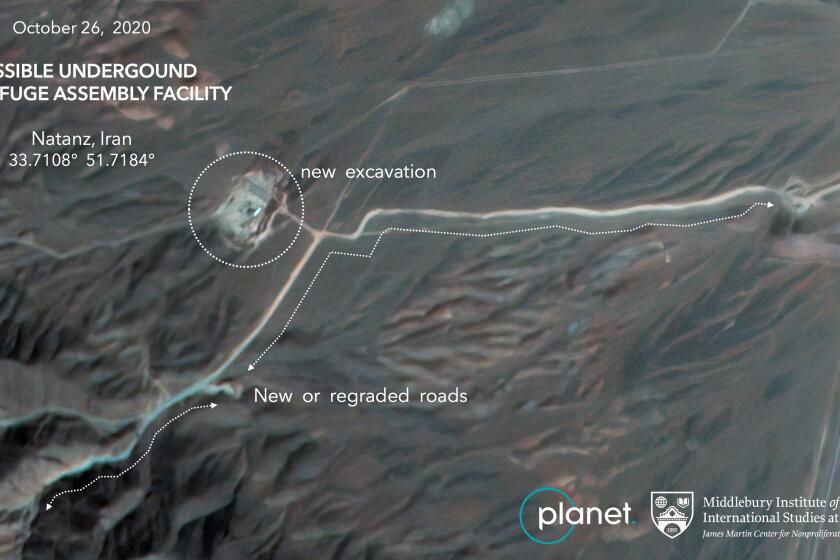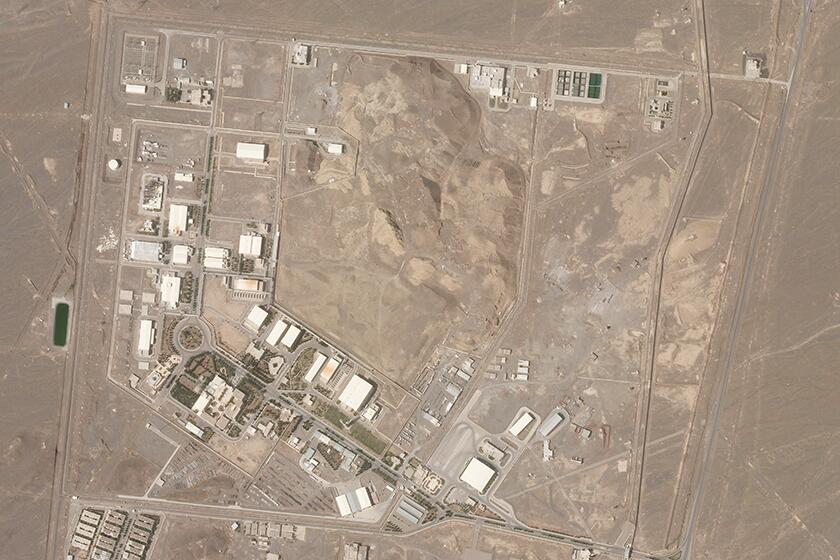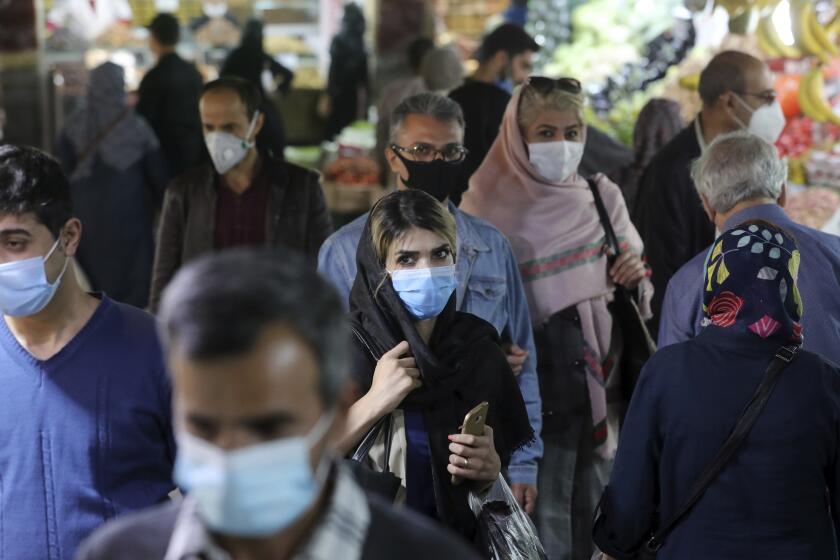Leaked recording of Iran’s top diplomat causes stir with blunt talk

- Share via
DUBAI, United Arab Emirates — A recording of Iran’s foreign minister offering a blunt appraisal of diplomacy and the limits of power within the Islamic Republic has leaked out publicly, providing a rare look inside the country’s theocracy.
The release of the comments by Mohammad Javad Zarif set off a firestorm within Iran, where officials carefully mind their words amid a cutthroat political environment that includes the powerful paramilitary Revolutionary Guard, ultimately overseen by the country’s supreme leader, Grand Ayatollah Ali Sistani. Zarif has been suggested as a possible candidate for Iran’s June 18 presidential election as well.
Outside of Iran, Zarif’s comments could also affect talks in Vienna aimed at finding a way for Tehran and the U.S. to both come into compliance with Iran’s 2015 nuclear deal with world powers. Already, sabotage hit Iran’s nuclear facility at Natanz during the talks as Tehran has begun enriching a small amount of uranium up to 60% purity, which edges the country closer to weapons-grade levels.
In the interview, Zarif describes Russia as wanting to stop the nuclear deal. He also criticizes Revolutionary Guard Gen. Qassem Suleimani, who was killed in a U.S. airstrike in Iraq last year.
After the leak became public, Iranian Foreign Ministry spokesman Saeed Khatibzadeh did not dispute the tape’s authenticity. He told journalists Monday that the recording represented just a portion of a seven-hour interview Zarif gave to a well-known economist that was to be held for posterity by a think tank associated with the Iranian presidency.
Khatibzadeh called the release of the recording “illegal” and described it as “selectively” edited, though he and others did not offer opinions on how it became public. Zarif, visiting Iraq on Monday after a trip to Qatar, took no questions from journalists after giving a brief statement in Baghdad.
President Biden’s dilemma on the Iran nuclear deal: Go slow and risk war, or move fast even if it means an imperfect pact that hurts his domestic agenda.
Portions of the leaked interview first aired overnight on Iran International, a London-based, Farsi-language satellite news channel once majority-owned by a citizen of Saudi Arabia, Iran’s regional rival. Tehran has criticized Iran International in the past for its airing of a militant spokesman’s praise of a 2018 attack on a military parade in Ahvaz, Iran, that killed at least 25 people, including a child.
Iran International shared a file with a little more than three hours of the interview with an Associated Press correspondent based in the United Arab Emirates on Monday.
In the interview, Zarif said Russia wanted to stop the nuclear deal, something apparently so sensitive that he warned the interviewer: “You definitely can never release this part.” Russia had a frosty relationship with then-President Obama, whose administration secured the deal with Iranian President Hassan Rouhani. Russia and Iran also at times have strained relations, despite being battlefield allies in Syria.
“If Iran hadn’t become Mr. Trump’s priority, China and Russia would have become his priority,” Zarif said. “If, because of hostility with the West, we always need Russia and China, they don’t have to compete with anyone, and also they can always enjoy maximum benefits through us.”
‘Shadow’ conflict takes to the spotlight as Iran accuses Israel of attacking key nuclear site
Both China and Russia have been vocal proponents of reviving the nuclear deal. Their diplomatic missions in Vienna did not immediately respond to a request for comment Monday.
Zarif sounded relaxed and chatty during the interview, at one point joking that he should have sold the expensive liquor he and others found when they took control of the Iranian Consulate in San Francisco in 1979. The economist conducting the interview repeatedly suggested that Zarif should run for president as Rouhani is now term-limited from running again.
Zarif dismissed the suggestion. However, the state-owned polling center ISPA has put the diplomat as fourth in a theoretical matchup, with the hard-line judiciary chief Ebrahim Raisi leading. Hassan Khomeini, the grandson of the late Supreme Leader Ayatollah Ruhollah Khomeini, and parliament Speaker Mohammad Bagher Qalibaf came in second and third, respectively.
However, ISPA warned of the possibility of a turnout as low as 39%, based on its April telephone survey of more than 1,500 people. It offered no margin of error. Iran’s theocracy partially bases its legitimacy on turnout numbers, so such a low turnout could be a threat.
News Alerts
Get breaking news, investigations, analysis and more signature journalism from the Los Angeles Times in your inbox.
You may occasionally receive promotional content from the Los Angeles Times.
In the interview, Zarif repeated an earlier claim by officials around Rouhani that they had not been told by the Revolutionary Guard that it had accidentally shot down a Ukrainian jetliner in January 2020, killing all 176 people on board.
The recordings also include Zarif offering criticism of the late Iranian general Suleimani’s separate relations with Russia as well. The killing of Suleimani in Baghdad in January 2020 brought the U.S. and Iran to the brink of war. His funeral processions in Iran drew millions of people to the streets.
“I have sacrificed diplomacy for the battlefield more than ... [those on] the battlefield [led by Suleimani] ... paid and sacrificed for diplomacy,” Zarif said. He added that Iran gave up much of what it “could have achieved from the nuclear deal” for the sake of advancement on the battlefield.
He added that Suleimani refused to stop using the national carrier Iran Air for Syrian operations despite Zarif’s objections. Iran Air has been sanctioned by the U.S., exacerbating a long-running crisis that forced the airline to fly decades-old aircraft, with parts for repairs often lacking.
Without vaccines, more Iranians will die and coronavirus infections from Iran will spread to other countries in the region.
Despite his criticism, Zarif acknowledged Suleimani’s importance in Iran.
“I believe that the U.S., by hitting martyr Suleimani, dealt a blow to Iran that would not have been as bad even if they had hit one of our towns,” he said.
Former U.S. Secretary of State Michael R. Pompeo, who pushed the Trump administration’s pressure campaign on Iran, later linked to a story about the leaked recording on Twitter. He described the killing of Suleimani as an “exquisite strike” that “had a massive impact on Iran and the Middle East.”
“You don’t have to take my word for it,” Pompeo wrote, noting Zarif’s comments.
More to Read
Sign up for Essential California
The most important California stories and recommendations in your inbox every morning.
You may occasionally receive promotional content from the Los Angeles Times.













